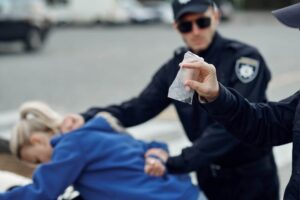If you’ve been arrested and charged with possession of a controlled substance, you may wonder whether there’s any way to get the charge dismissed. New Jersey offers several possibilities for getting a drug possession charge dismissed, although this option isn’t available in all cases and depends on your unique circumstances.
It’s not easy to get drug possession charges dismissed. However, a knowledgeable New Jersey drug crimes defense lawyer can help you understand your options, guide you through the process, and pursue a favorable outcome that allows you to move forward more easily after a legal challenge.
Contents
- 1 What Is the Most Common Drug Possession Charge?
- 2 What Are New Jersey’s Drug Possession Laws?
- 3 What Are Some of the Most Common Ways to Beat a Drug Possession Charge?
- 4 What Is a Conditional Discharge Program?
- 5 What Is Pretrial Intervention?
- 6 How Can a New Jersey Criminal Defense Attorney Help?
- 7 Contact a New Jersey Drug Crimes Defense Lawyer
What Is the Most Common Drug Possession Charge?
Now that possession of up to six ounces of marijuana is legal for adults age 21 and older in New Jersey, the most common drug possession charges are:
- Possession of marijuana by individuals under 21
- Possession of more than six ounces of marijuana
- Possession of other controlled substances
- Possession of drug paraphernalia
New Jersey’s controlled dangerous substances schedule classifies drugs based on their potential for abuse and their recognized use for medical purposes.
Schedule I illegal drugs are those with the highest potential for abuse and a lack of accepted medical uses in the United States. These include a wide variety of opiates and narcotics, including heroin and LSD. Most other opiates and narcotics, including cocaine, are classified as Schedule II substances.
Schedule III substances include most stimulants and barbiturates, as well as certain narcotics. Ketamine and methamphetamine are examples of Schedule III substances.
Schedule IV and V substances have a lower potential for abuse and are accepted for use in medical treatment, but they also have the potential to cause dependency.

What Are New Jersey’s Drug Possession Laws?
New Jersey forbids the possession of controlled dangerous substances without a valid prescription. Possession of Schedule I, II, III, and IV substances is a third-degree felony punishable by 3 to 5 years in prison and a fine of up to $35,000. Possession of a Schedule V substance is a fourth-degree felony punishable by up to 18 months in prison and a fine of up to $15,000.
Possession of more than six ounces of marijuana is a fourth-degree felony regardless of the age of the offender. Underage possession of up to six ounces of marijuana results in a series of written warnings.
What Are Some of the Most Common Ways to Beat a Drug Possession Charge?
The most favorable outcome in your drug case is for your criminal defense attorney to successfully persuade the prosecution to drop the charges against you. There are several potential defense strategies they may use, depending on the circumstances of your arrest:
- The police unlawfully searched your vehicle or person, such as by searching without probable cause or otherwise violating your constitutional rights.
- The substance was contaminated, tampered with, or unaccounted for at any point between the seizure and being sent to the testing lab.
- The substance wasn’t tested according to proper procedures or in a timely fashion.
- The substance was not in your possession.
- There was no intent to distribute the substance.
Police are required to follow precise procedures when arresting someone for drug crimes and seizing controlled dangerous substances. If your attorney uncovers any failure to follow proper procedure or can otherwise call the charges into question, they may be able to secure the dismissal of the charges against you. They may do this by presenting evidence in your favor or successfully moving to suppress evidence obtained illegally or improperly.
What Is a Conditional Discharge Program?
If you’re a first-time offender in violation of New Jersey drug possession laws, you may qualify to participate in a conditional discharge program. This program allows you to have your charges dismissed after successfully completing a term of probation.
Completion of the program requires you to meet with an assigned probation officer, who will provide direction regarding the payment of any fees, fines, or restitution. You’ll also be required to take a drug test. If you pass, you won’t be required to meet with the probation officer again. Upon completing your probation, your case will be dismissed, and all charges will be dropped.
What Is Pretrial Intervention?
New Jersey also has a Pretrial Intervention (PTI) program geared toward first-time offenders who may benefit from counseling and other services instead of serving jail time. For example, an offender whose possession charge stems from their struggle with prescription drug addiction may be able to have their first-time possession charge dismissed if they successfully complete PTI.
The program can last as long as 36 months and involves regular meetings with a probation officer, payment of certain fees, and full compliance with treatment recommendations and requirements.
Ask your criminal defense lawyer whether you might be a good candidate for the conditional discharge or Pretrial Intervention programs.
How Can a New Jersey Criminal Defense Attorney Help?
Facing criminal charges can be stressful and confusing. A New Jersey drug crimes defense attorney can help you navigate the legal system and ensure your rights are upheld throughout the process. Thanks to their knowledge of the law, understanding of the system, and experience handling drug cases, your attorney can advocate for your rights and pursue the most favorable outcome for your case.
At every stage of the process, from pretrial negotiations through the trial and its aftermath, your attorney will look out for your best interest and be prepared to provide the information and support you need.
Contact a New Jersey Drug Crimes Defense Lawyer
The Law Office of Jason A. Volet has over 15 years of experience handling felony and misdemeanor cases for New Jersey and New York clients, including drug cases ranging from simple possession to distribution and more.
When you’re facing drug charges, you need a New Jersey drug crimes defense attorney with significant experience representing clients charged with these serious offenses. You can trust our team to provide the attentive, detail-oriented, and personalized legal services you need. Contact us today to review your legal options in a free consultation.

 What Happens if These Rights Are Not Read?
What Happens if These Rights Are Not Read?



